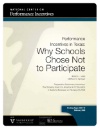Performance Incentives in Texas: Why Schools Chose Not to Participate
 This study examines why 51 schools declined in invitation to participate in a state-funded educator incentive initiative, the Texas Educator Excellence Grant (TEEG) program. Using data from an ongoing evaluation of the TEEG program conducted by the National Center on Performance Incentives (NCPI) under contract with Texas Education Agency, this article examines reservations that school leaders expressed about participating in the program. Findings suggest that schools’ decisions were less about outright opposition to performance incentive policies in education and more about the interplay between a school’s organizational context and particular features of the TEEG program. Specific concerns included that: (1) guidelines for distributing awards to school personnel were inequitable; (2) performance incentives might be detrimental to a school’s culture; (3) the school selection process did not recognize other teachers’ or schools’ contribution to students’ academic success; and (4) time demands and technical expertise needed to implement the program outweighed perceived benefits. Many school leaders described these concerns as being even more problematic in small districts and schools. Future efforts to implement similar programs should consider the appropriate balance between state guidelines and local flexibility, clearly communicate program guidelines and regulations, offer technical assistance, and allow sufficient time for schools to plan their educator incentive programs.
This study examines why 51 schools declined in invitation to participate in a state-funded educator incentive initiative, the Texas Educator Excellence Grant (TEEG) program. Using data from an ongoing evaluation of the TEEG program conducted by the National Center on Performance Incentives (NCPI) under contract with Texas Education Agency, this article examines reservations that school leaders expressed about participating in the program. Findings suggest that schools’ decisions were less about outright opposition to performance incentive policies in education and more about the interplay between a school’s organizational context and particular features of the TEEG program. Specific concerns included that: (1) guidelines for distributing awards to school personnel were inequitable; (2) performance incentives might be detrimental to a school’s culture; (3) the school selection process did not recognize other teachers’ or schools’ contribution to students’ academic success; and (4) time demands and technical expertise needed to implement the program outweighed perceived benefits. Many school leaders described these concerns as being even more problematic in small districts and schools. Future efforts to implement similar programs should consider the appropriate balance between state guidelines and local flexibility, clearly communicate program guidelines and regulations, offer technical assistance, and allow sufficient time for schools to plan their educator incentive programs.
To read this paper, please click here
Connect with Vanderbilt
©2026 Vanderbilt University ·
Site Development: University Web Communications